#IWishMyTeacherKnew Reveals the Untold Story of Underprivileged Children at School

Hitting the books isn't as simple as it sounds for some students. One Colorado teacher learned that lesson the hard way from an unwitting source: her students.
Kyle Schwartz asked third-graders in her Denver classroom to write her notes about things they wish she understood about their lives. Schwartz told ABC News she knew her students came from underprivileged homes but wanted to truly understand how that affected their lives and education. So she asked them directly, as part of a lesson plan called "I Wish My Teacher Knew."
The students' notes weren't drawings of cartoons and superheroes. Instead, the kids candidly expressed their own struggles with poverty, immigration and loneliness. Schwartz said she felt compelled to share her students' heartbreaking reflections on Twitter, using #IWishMyTeacherKnew. They come as a stern reality check.
Building a community. Schwartz said she made the notes public to encourage other teachers to conduct the same lesson plans with their students so they can better understand their lives. Some students wrote anonymously, but others wanted to share with their fellow classmates. Even in the most sensitive of cases, it's helped them bond with each other.
"Building community in my classroom is a major goal of this lesson. After one student shared that she had no one to play with at recess, the rest of the class chimed in and said, 'We got your back,'" Schwartz told ABC News. "The next day during recess, I noticed she was playing with a group of girls. Not only can I support my students, but my students can support each other."
And in that spirit, sure enough, other educators took up Schwartz's call.
These kids are making a strong point. It's hard enough learning math, reading and writing skills without the added difficulties brought on by struggles with home life, making friends or affording basic school supplies. Unfortunately, that's not always the case — with race and other socio-economic factors creating other barriers.
According to studies, coming from a low socio-economic status has been shown to affect academic achievement, quality of teaching and it increases the likelihood for mental health issues associated with stressful situations in the home. And as a 2006 report from the Annie E. Casey Foundation concluded, black and brown young people often get the short end of the stick in public schools, facing resource disparities and lower access to academic opportunities compared to their white peers. Indeed, the majority of students in Denver's public schools, where Schwartz teaches, are black or Latino.
If anything, #IWishMyTeacherKnew is a welcome wake-up call that children everywhere need as much support as they can get in their quest for learning — because it's likely they're carrying a weight much heavier than their books.